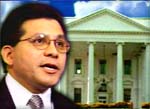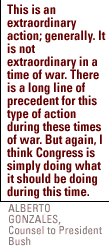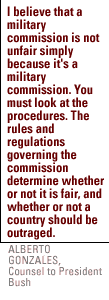|
| |
|
|
|
| NEWSMAKER: ALBERTO GONZALES | |
November 28, 2001 | |
 |
After a report on the Senate Judiciary Committee hearings on military tribunals, Jim Lehrer talks with White House General Counsel Alberto Gonzales about the war-time precedents for military tribunals and its affect on civil liberties. |
|
JIM
LEHRER: Mr. Gonzales, welcome.
ALBERTO GONZALES, Counsel to President Bush: Good evening. JIM LEHRER: First, is the president having any second thoughts about this military tribunal decision?
JIM LEHRER: Is there, were you and the President expecting this kind of growing storm about it? ALBERTO GONZALES: I don't know if I would characterize it as a growing storm, Jim. I think what you're seeing from the Hill is the exercise by Congress of its oversight role of actions by the executive branch. So I wouldn't call it a storm of criticism. Again, I think people of course are looking at the actions carefully, as they should be. This is an extraordinary action; generally. It is not extraordinary in a time of war. There is a long line of precedent for this type of action during these times of war. But again, I think Congress is simply doing what it should be doing during this time. |
||||||||||||||||||||||||||||
| Fair to foreigners? | |||||||||||||||||||||||||||||
|
JIM LEHRER: New York Times columnist Anthony Lewis was on this program last night and he said the way the order is drafted, some 20 million foreigners living in the United States could be tried under this. Is he right? ALBERTO GONZALES: Well, let me just say, Jim, that the order is requiring the president of the United States himself to make a determination that is in the best interests of this country, that a member of al-Qaida or another terrorist from another terrorist group or someone who has harbored a member of al-Qaida, that that person should be subject to the jurisdiction of military commissions. And again, the commission is only going to be entitled to try someone for violations of the law of war.
ALBERTO GONZALES: To provide maximum flexibility for this president to deal with contingencies unforeseen, Jim. JIM LEHRER: So in other words it could apply to people beyond al-Qaida? ALBERTO GONZALES: Well, again, we need to wait and see if the regulations promulgated by the Department of Defense. This is only the first step that's been taken. The Department of Defense is now in the process of promulgating the rules and regulations by which -- which will govern these military commissions. I will tell you that already the Department of Defense has had informal consultations with the Department of Justice, it will have formal consultations with DOJ and other agencies so that people should feel comfortable that the rules promulgated by the Department of Defense will be fair. Terrorists were tried pursuant the military commissions will receive a full and fair trial. That is the command from the commander in chief, down to the secretary of defense. And one final thing to provide reassurance to the citizens of the United States, I have every expectation when these regulations are promulgated by the Department of Defense that they will be made public and people will be able to judge for themselves that in fact the secretary of defense has followed the orders of the commander in chief. JIM LEHRER: We heard just now on tape Mr. Chertoff's answer to Senator Leahy's concern that this sends a terrible message to the world that it says we don't have confidence in our own judicial system. How would you respond to Senator Leahy?
The criticism that we may have leveled around the world at other countries regarding military trials or secret trials stems from the fact that we have not had confidence that the trials were of themselves independent and impartial. Here in the United States, we have a statute that provides that military officers who participate military proceedings like military commissions must discharge their responsibilities in a fair and impartial manner. JIM LEHRER: Columnist William Safire made that very point that we would be outraged if China, for instance, sets up a military tribunal like this similar to what we are proposing. ALBERTO GONZALES: Well, I must disagree with that. I believe that a military commission is not unfair simply because it's a military commission. You must look at the procedures. The rules and regulations governing the commission determine whether or not it is fair, and whether or not a country should be outraged. And again it's premature at this juncture to judge that because the rules and regulations have not been promulgated as of yet. |
 | ||||||||||||||||||||||||||||
| Impact on minorities | |||||||||||||||||||||||||||||
|
JIM LEHRER: Earlier in the program, Margaret Warner interviewed the Egyptian foreign minister, and he expressed concern that not only the military tribunals but these large detentions of foreign nationals here in the United States, that they not be directed solely or mostly at Arabs and Muslims. What can you say to him about that?
JIM LEHRER: But is it's not in fact true that the over 600 detainees now that still remain, most of them are Middle East origin? ALBERTO GONZALES: They may be of Middle East origin, Jim, I don't know for sure. But what I understand and you'll have to talk with the folks at the Department of Justice about this, is that the decisions were based primarily on where people came from, the country of origin -- their age range, and things of that nature -- not based upon race or ethnicity or religion. |
|||||||||||||||||||||||||||||
| Who decides to set up tribunals? | |||||||||||||||||||||||||||||
|
JIM LEHRER: How involved are you and the president in this overall program, this overall plan, this anti-terrorist plan that Attorney General Ashcroft is announcing and has announced one piece at a time? ALBERTO GONZALES: I'm sorry, Jim, did you say --. JIM LEHRER: How involved are you and the president, you directly or you on the president's behalf in formulating these plans? ALBERTO GONZALES: Well, the president has a great deal of confidence in members of his cabinet, Jim; that is the way he operates and he manages. And he picks good people to deal with responsible jobs, and the first of, defers to their judgment. Obviously, he's advised every step of the way. He does get involved in making key decisions, was involved in making some key decisions regarding military commissions. So he is very much involved in the war going on here in the homeland, as well as overseas. JIM LEHRER: Sure. How about you as White House counsel?
JIM LEHRER: In terms of the detainees, here again there's been some criticism of that. I won't use the word storm again, I won't use any word, there's been some criticism of the detainees. Is it correct, what's been written in the last few days, that the real priority now of the anti-terrorism effort by the FBI and Justice Department is aimed at preventing future terrorist acts more than it is in arresting and prosecuting people who may have participated in the Sept. 11 attacks? ALBERTO GONZALES: Well, they're both obviously equally important, Jim. Obviously, those who were responsible for the acts of Sept. 11 should be caught and they need to be punished. But equally important, is to do everything that we can to insure that there are no future attacks on Americans here or overseas. JIM LEHRER: That's new, though, is it's not? Isn't that a new direction for the FBI and Justice Department? ALBERTO GONZALES: Jim, I think that has been a priority from day one. JIM LEHRER: No, I mean day one since Sept. 11. But prior to Sept. 11, wasn't the FBI primarily a law enforcement agency that investigated crimes that had already been committed, rather than in the business of prevention? ALBERTO GONZALES: Jim, I don't feel comfortable answering that question. You'll have to talk to the Director Mueller. But again I would just repeat that preventing terrorism has been a priority for the FBI, and capturing those who are responsible for the attacks on Sept. 11 remain a priority. |
 | ||||||||||||||||||||||||||||
| Potential threat to civil liberties | |||||||||||||||||||||||||||||
|
What would you say in general about them to make those folks feel more comfortable at this stage? ALBERTO GONZALES: We of course are in an extraordinary time, Jim. And these call for different kinds of measures. But I can assure you that we have looked at everything that's been done by the administration carefully, from a legal perspective; everything that has been done, I think is well within the requirements of the constitution and the laws passed by Congress. JIM LEHRER: And you think they're well within the framework of what the American people want done as well? ALBERTO GONZALES: I believe genuinely the American people support the efforts of this administration. Again, for example, the establishment of the military commission, the president simply felt that was a necessary tool that needed to have at his ready disposal to deal with future terrorist attacks. JIM LEHRER: Was that in fact the idea of the Justice Department? Where did that come from, who brought it to the president to sign off on?
JIM LEHRER: It wasn't done lightly, in other words? ALBERTO GONZALES: No, sir, not at all. A great deal of time and effort was put into this project. JIM LEHRER: All right. Mr. Gonzales, thank you very much. ALBERTO GONZALES: Thank you, Jim. |
|||||||||||||||||||||||||||||
![]()
home | newshour index | search | forum | political wrap | letters | essays & dialogues | off camera | pbs online
The NewsHour is funded, in part, by:

![]()

Copyright © 2001 MacNeil-Lehrer Productions. All Rights Reserved.